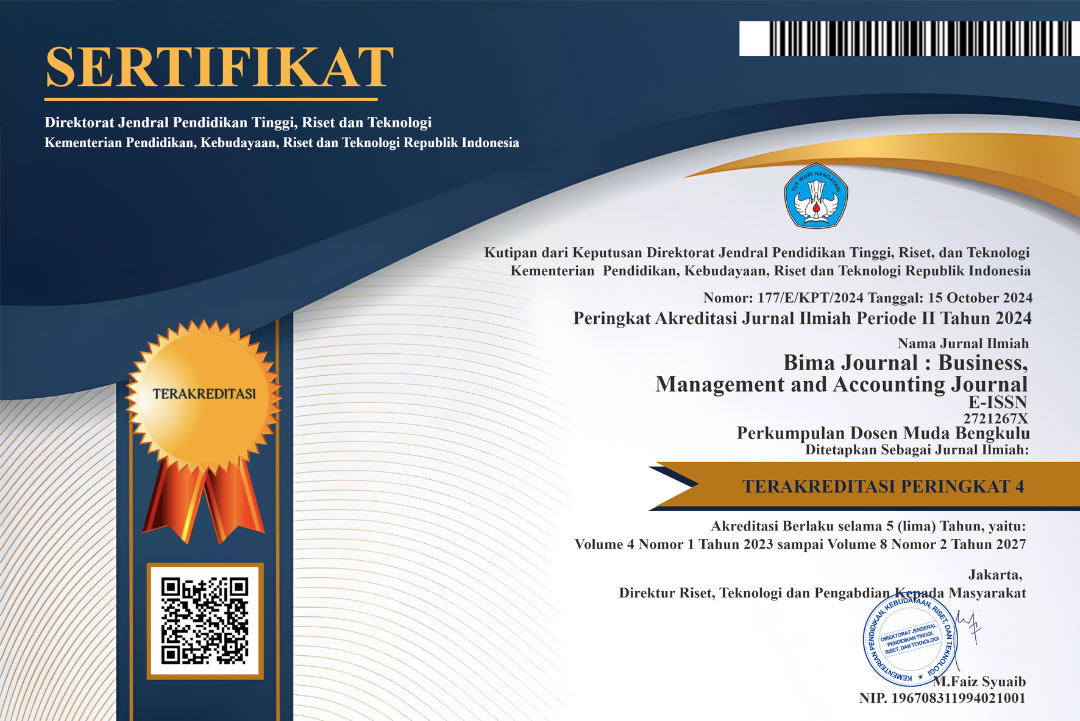Does Employee Turnover Intervene Team Performance ?
DOI:
https://doi.org/10.37638/bima.2.2.167-176Keywords:
Leadership, Teamwork, Turnover, Team Performance.Abstract
This study describes the effect of leadership and teamwork on employee turnover and impact in team performance. The object of this research is PT Dreamaxtion Teknologi Internasional. This study uses a quantitative method through a questionnaire survey which was distributed directly to 60 respondents which was then processed using SPSS version 20.0 and the sampling method was non-probability sampling. The results of hypothesis testing (t test) that leadership has a significant effect on Team Performance with t count of 4.222 T table 2.002. Teamwork has a significant effect on Team Performance with t = 3.121 ≥ T table 2.002. And Turnover has no significant effect on Team Performance with t = 1.152 ≤ T table 2.002. Leadership and Teamwork have a significant effect on Team Performance while Employee Turnover has no significant effect on Team Performance. The implications of this research can provide an understanding for the management that although Turnover does not affect in Team Performance, it must still be considered, especially at PT Dreamaxtion Teknologi Internasional.
References
Generation Z and Its Perception of Work. (2016). Cross-Cultural Management Journal, 18(1).
Hadi Wibawa, N., & Soedarsono, D. K. (2016). Pengaruh Employee Engagement terhadap Kepuasan Kerja dan Turnover Intention pada PT. Finnet Indonesia.
Kim Siew, L. (2017). Analysis of the Relationship between Leadership Styles and Turnover Intention within Small Medium Enterprise in Malaysia. In Journal of Arts & Social Sciences (Vol. 1).
Olvera, J., Llorens, S., Acosta, H., & Salanova, M. (2017). Transformational leadership and horizontal trust as antecedents of team performance in the healthcare context. 33, 365–375. https://doi.org/10.6018/analesps.33.2.237291
Purwanto, E. A., & Sulistyastuti, D. R. (2017). Metode Penellitian Kuantitatif. Yogyakarta: Andi Offset.
Rydenfält, C., Borell, J., & Erlingsdottir, G. (2019). What do doctors mean when they talk about teamwork? Possible implications for interprofessional care. Journal of Interprofessional Care, 33(6), 714–723. https://doi.org/10.1080/13561820.2018.1538943
Santoso, C. B. (2019). Exploration of Asia Leadership Theory: Looking for an Asian Role in the Field of Leadership Theory. Journal of Leadership in Organizations, 1(1), 67–78. https://doi.org/10.22146/jlo.44599
Srimindarti, C., Oktaviani, R. M., & Hardiningsih, P. (2017). Antecedents of Job Satisfaction and the Influence on Turnover Intention. 8(2), 177–187. https://doi.org/10.15294/jdm.v8i2.12758
Sulamuthu, G. A., & Yusof, H. M. (2018). Leadership Style and Employee Turnover Intention.
Zaheer, S., Ginsburg, L., Wong, H. J., Thomson, K., Bain, L., & Wulffhart, Z. (2019). Turnover intention of hospital staff in Ontario, Canada: Exploring the role of frontline supervisors, teamwork, and mindful organizing. Human Resources for Health, 17(1). https://doi.org/10.1186/s12960-019-0404-2)
Downloads
Additional Files
Published
Issue
Section
License
An author who publishes in the BIMA JOURNAL: Business, Management, and Accounting Journal agrees to the following terms:
Author retains the copyright and grants the journal the right of first publication of the work simultaneously licensed under the Creative Commons Attribution-ShareAlike 4.0 License that allows others to share the work with an acknowledgement of the work's authorship and initial publication in this journal
Submission of a manuscript implies that the submitted work has not been published before (except as part of a thesis or report, or abstract); that it is not under consideration for publication elsewhere; that its publication has been approved by all co-authors. If and when the manuscript is accepted for publication, the author(s) still hold the copyright and retain publishing rights without restrictions. For the new invention, authors are suggested to manage its patent before published. The license type is CC-BY-SA 4.0.
BIMA JOURNAL: Business, Management and Accounting is licensed under a Creative Commons Attribution-ShareAlike 4.0 International License.
You are free to:
Share — copy and redistribute the material in any medium or format
Adapt — remix, transform, and build upon the material
for any purpose, even commercially.
The licensor cannot revoke these freedoms as long as you follow the license terms.
Under the following terms:
Attribution — You must give appropriate credit, provide a link to the license, and indicate if changes were made. You may do so in any reasonable manner, but not in any way that suggests the licensor endorses you or your use.
ShareAlike — If you remix, transform, or build upon the material, you must distribute your contributions under the same license as the original.
- No additional restrictions — You may not apply legal terms or technological measures that legally restrict others from doing anything the license permits.
Notices:
- You do not have to comply with the license for elements of the material in the public domain or where your use is permitted by an applicable exception or limitation.
- No warranties are given. The license may not give you all of the permissions necessary for your intended use. For example, other rights such as publicity, privacy, or moral rights may limit how you use the material.





















